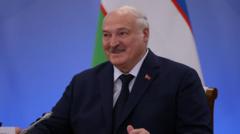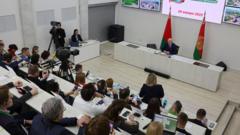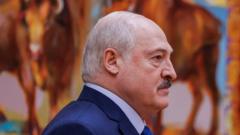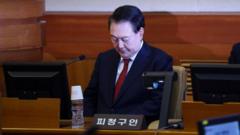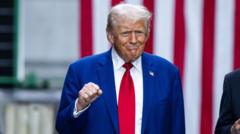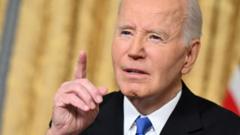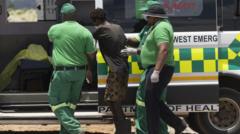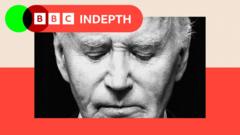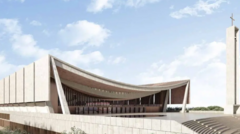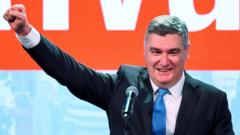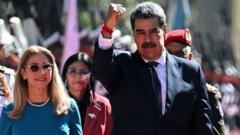With the counting of votes now in progress in Ghana after the general elections held on Saturday, the country anticipates a leadership transition as Nana Akufo-Addo steps down after two terms. The atmosphere during voting was largely calm, although there was a tragic incident involving a shooting in Nyankpala, which led to four arrests. In response, military forces have been deployed to maintain order.
Vote Counting Underway in Ghana as New Leadership Awaits
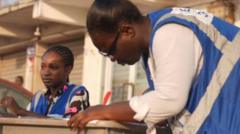
Vote Counting Underway in Ghana as New Leadership Awaits
Ghana prepares for a potential leadership change as votes are tallied after a peaceful election day marred by isolated violence.
Polling stations concluded operations at 17:00 GMT, and results are projected to be made public on Tuesday. Due to heightened security measures, Ghana closed its land borders until Sunday evening, a move observers find unusual in such contexts.
Among the candidates vying for the presidency, former President John Mahama represents the National Democratic Congress (NDC) and seeks to regain power, while Vice-President Mahamudu Bawumia is contending for the ruling New Patriotic Party (NPP). If successful, Bawumia would make history as Ghana's first Muslim president. Other notable figures include Nana Kwame Bediako, a businessman aiming to capture the youth vote, and Alan Kyerematen, who recently defected from the NPP.
With nearly 19 million registered voters, only one female candidate, Nana Akosua Sarpong Frimpomaa of the Convention People's Party, stands amidst a backdrop where women's representation remains limited—particularly after the unfortunate passing of another female candidate in October, whose name will still appear on the ballots due to disqualification issues around her successor.
Voters across 275 constituencies also elected parliamentary representatives during this critical moment in Ghana's democracy. Historically, the political landscape has seen dominance from either the NDC or NPP since transitioning to multi-party politics in 1992, with no party managing more than two consecutive terms in office.
In order to secure an outright win, a presidential candidate must achieve over 50% of the votes. Should no candidate reach this threshold, the top two will advance to a run-off election before the end of December.
First-time voter and recent graduate Serwaa Yeboah Joshebeth, age 18, emphasized the importance of voting for the nation's future while expressing her hopes for more job opportunities. Similarly, Kojo Yeboah, a 95-year-old retired university worker, echoed that educational advancements and employment strategies must be prioritized.
As campaigning concluded, Bawumia boasted about the government's performance relative to his rival Mahama, who reminded voters of a vision for an equitable Ghana replete with opportunities. Economic challenges, primarily steep inflation rates and high unemployment among youth, loom heavily over voter sentiment in this pivotal election, which could significantly shift Ghana's political landscape.
Ghana's recent economic hurdles, including a peak inflation rate of 54.1% in 2022, have left many in poverty, underscoring the urgency for change. The current administration is navigating complex negotiations with international lenders following a debt default.
As Ghana anticipates its future leadership amid such pressures, citizens are ready to make their voices heard.
Among the candidates vying for the presidency, former President John Mahama represents the National Democratic Congress (NDC) and seeks to regain power, while Vice-President Mahamudu Bawumia is contending for the ruling New Patriotic Party (NPP). If successful, Bawumia would make history as Ghana's first Muslim president. Other notable figures include Nana Kwame Bediako, a businessman aiming to capture the youth vote, and Alan Kyerematen, who recently defected from the NPP.
With nearly 19 million registered voters, only one female candidate, Nana Akosua Sarpong Frimpomaa of the Convention People's Party, stands amidst a backdrop where women's representation remains limited—particularly after the unfortunate passing of another female candidate in October, whose name will still appear on the ballots due to disqualification issues around her successor.
Voters across 275 constituencies also elected parliamentary representatives during this critical moment in Ghana's democracy. Historically, the political landscape has seen dominance from either the NDC or NPP since transitioning to multi-party politics in 1992, with no party managing more than two consecutive terms in office.
In order to secure an outright win, a presidential candidate must achieve over 50% of the votes. Should no candidate reach this threshold, the top two will advance to a run-off election before the end of December.
First-time voter and recent graduate Serwaa Yeboah Joshebeth, age 18, emphasized the importance of voting for the nation's future while expressing her hopes for more job opportunities. Similarly, Kojo Yeboah, a 95-year-old retired university worker, echoed that educational advancements and employment strategies must be prioritized.
As campaigning concluded, Bawumia boasted about the government's performance relative to his rival Mahama, who reminded voters of a vision for an equitable Ghana replete with opportunities. Economic challenges, primarily steep inflation rates and high unemployment among youth, loom heavily over voter sentiment in this pivotal election, which could significantly shift Ghana's political landscape.
Ghana's recent economic hurdles, including a peak inflation rate of 54.1% in 2022, have left many in poverty, underscoring the urgency for change. The current administration is navigating complex negotiations with international lenders following a debt default.
As Ghana anticipates its future leadership amid such pressures, citizens are ready to make their voices heard.

